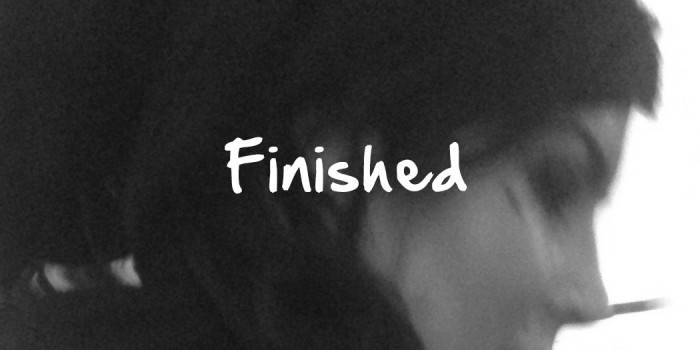Finished
by Joshua Sidley
Abruptly one day my ex-wife stopped speaking to me in any recognizable way. What came out instead in our weekly discussions, which were centered mostly on our eight year-old son Charlie, were breathless musings about his unique style of speech toward adults, mindless philosophy regarding his silence toward other children, and a claim that something special was waiting for them both. Just when I started to grow attuned to it all, a new voice emerged, an articulation of a secret unhappiness that felt every bit as false as my wish that she remarry.
My son had warned me, or tried to. “I think Mom needs help, or something. It’s because she’s lonely. She misses us.”
I nodded and sighed. “Did she tell you that?” I asked, hating the sound of my (father’s) voice in that instant.
“No—I mean yeah. In that way she has. I told you.” And he had, he had.
Unfortunately, I had been half asleep—dreaming—at the time.
In the dream Kathryn stood folding a bed sheet and staring at her swollen belly. She signed and clamped her teeth as an unborn Charlie, a week overdue, spoke to her, inside her. Asked her questions, all kinds. His voice in her mind was perfectly clear but if she did not reply immediately she would forget what he had said, his words dissolving in her bloodstream. Blinking tears, she claimed that Charlie was making it happen. He was not giving her enough time to answer him, causing her to unremember his most recent inquiry, and yet she always knew he had said something. Sometimes she called him spiteful and a hypocrite. If the little brat’s that impatient, what the hell is he doing still backstroking in there? she asked me eventually. What does he expect me to do?
I pretended to think about it. Catch up, I said.
Before the divorce, when Charlie warned me about Kathryn I barely heard him. And after, when his warnings persisted I thought he was merely getting back at me, making me think what happened was my fault. I told him it wasn’t and he responded coolly, “She knows that. Everybody knows that.”
How strange, that I hadn’t known that.
What I did know: the difference between a panic attack and a nervous breakdown. Before the divorce, during our very worst arguments my wife had experienced intense panic attacks, acute rushes of adrenaline when it became clear her side of the argument was lost. And one week after, in another state, she had a nervous breakdown in a barricaded room somewhere, alone.
The first thing I ever noticed about Kathryn was her fingers, tapping absently against the side of her head, just above her cheekbone. She saw me and her fingers stopped tapping and her lipsticked mouth formed a grin. Months after we were married I had a dream about this initial encounter; except in the dream, when her fingers stopped tapping, one of them came away bloody.
Life is a beautiful and hideous thing, she had told my father once, and from what I knew of her childhood, I’d thought her declaration entirely reasonable. It irked him the way most things had when he wasn’t soaked in alcohol. “What is that even supposed to mean?” he challenged.
“It means that every flower has its mound of shit from which it sprang,” she said, looking directly at me.
My father was stunned into silence, and I into the profoundest love I had known; until then at least.
Her arms around my neck, pulling. Always in the oddest places, a smile of mockery, of premeditated impulsiveness. Daring me to object, knowing it would only encourage her more; and knowing that, I’d object strongly.
Eighteen months of marriage. Then seeing Charlie for the first time, Kathryn in an epidural-induced fog and myself more awake than I’d ever been in my life, wanting to speak, knowing it would only reveal how unprepared, how truly uncomfortable we both were. Knowing that, I said nothing at all.
Charlie was an uneasy child, his sleep ravaged by every sort of nightmare. Sometimes he would run from his room and out of the house before either of us could stop him (though it seemed like each time Kathryn tried less and less). The reason for these nightmares was not something Charlie was ever willing to discuss. No one who knew him could understand or help him, he said. When I asked him why, he replied, exasperated, “Because. That’s how nightmares work.”
Soon there was always a day in the week that each time the doorbell rang, it was him. A stranger, recommended to us by neighbors who’d heard Charlie in the night. A stranger hired to observe, speak, listen closely to what our son said (and would not say). For a while the stranger’s day was Tuesday. Since there was no choice but to open the door, one of us did while the other stared tensely at the floor. Feeling emptied out, inadequate. Trying not to think of ourselves as failures, of Charlie as victim.
Three months later Kathryn told me the stranger wasn’t coming back. “Why not?” I asked, halfway knowing what she was going to say.
“Asshole wasn’t helping,” she muttered. “So I fired him.”
I nodded, shrugged. “Okay. Now what?”
“Now what what?” she spat out, then softened after a moment. “Honey, Charlie is not the problem. Never has been and everyone knows it.”
How odd, that I hadn’t known that.
But it was Kathryn that had led me to take a closer look at Charlie, calling him a highly peculiar boy not long after his fourth birthday. “Did you know he actually asked me if I was his mother once? He wasn’t sure!”
I bit my lip, anger welling up in me toward Charlie.“When was this?”
“I can’t remember,” she said and made a dismissive gesture. “Ask him.” And when I did, Charlie couldn’t remember either. But he assured me whatever doubts he’d had were gone. “Don’t worry, she’s definitely Mom.”
I wanted to force him to say more, what he had meant by doubting his mother’s identity at all.
Fuck it, I thought instead.
“I’m not responsible for what he says or does! Why must anyone look at me?”
I told her that she was not responsible—we both were. That more and more she was withdrawing from Charlie and from me, and that if she wanted to be freed of all culpability concerning our son’s odd conduct (on that day he’d asked several teachers if hate actually existed or was it merely the absence of love, and was outraged at all their answers) then she knew what to do. “Just as your mother did right in front of you. Or have you forgotten?”
Stricken, hiding her face in her hands, she rushed to the bathroom and vomited.
Some days Kathryn would arrive home later than others, some explanations were better, more likely, than others. I was slightly suspicious perhaps, but I hid it well. Even when she finally admitted to a brief affair with another man whom she barely knew, I hid my hatred for her surprisingly well.
A hospital administrator two states away called nearly a month after the divorce (of course Kathryn’s medical records still had me listed as her emergency contact). In a lowered, urgent voice the administrator politely informed me that she had caused a disturbance in a local motel, had barricaded the door to her room after the manager tried to gain access. The poor man, in his early seventies, was simply responding to complaints from other guests. Screams, they said. Objects thrown against the walls, broken. The police came and arrested her. They were accompanied by an emergency services team which included a physician who, after failing to calm her, had her committed to an area hospital.
“So what exactly do you want me to do about this?” I asked in disbelief.
Catch up, a voice inside me said.
In three months Kathryn’s treatment team determined that she no longer needed inpatient care and handling. She had suffered an acute psychological collapse following a long period of stress which had not been adequately dealt with, according to the doctor who’d admitted her. Through psychotropic medications, therapeutic interventions and rest, she was restored to her previous level of functioning; though I wondered how exactly could they know that. Yet after speaking with her about why our marriage ended and where we could both go from there, I had to agree—so did Charlie. Kathryn was herself again.
This was the dangerous time.
Because Charlie began to feel threatened in Kathryn’s company. Because during his bimonthly weekend visits to her new apartment—less than a mile away from us, her idea—she would become drenched in perspiration if he asked a question she could not answer instantly. Because she followed him everywhere, into the kitchen, the bedroom, even the bathroom—almost. Because she refused to answer her cell phone in his presence, as though he would object to the distraction, talk that may or may not include him. Because she questioned him closely if he had left her sight for more than a minute without warning. Because she recoiled if Charlie expressed any irritation with anything at all.
One day Charlie called me to ask if I could come and get him a day early, saying he was not feeling well, saying Kathryn’s behavior was making his head spin and his stomach hurt.
“Why are you acting like this, making him so uncomfortable, making him sick?” I confronted her at the door, “What the hell are you thinking?”
“I’m not thinking anything!” she cried. “He won’t let me!”
I looked over her shoulder and saw Charlie waiting for me in the car, his head in his hands.
A week later, a handwritten letter from Kathryn arrived in the mail. It read:
I’m sorry for what I am.
I love you so much.
K
I carefully folded the letter and looked up. Through a teary haze the face of Charlie stared.
The telephone rang the next day, near midnight.
They—she and Charlie—had come to a decision, Kathryn was telling me.
“Okay. When?” I asked, and stepped lightly into Charlie’s room. He was sprawled across the bed, sleeping soundly on his stomach. “When?” I asked again.
“Now. Just now,” she said.
I wanted to embrace her. “All right. Why don’t you wait until the morning and we’ll talk about it then?”
“I can’t. I’d like to but Charlie says it has to be right now. This second.”
Goddammit, I thought, holding back tears. “Well, wh-what is this decision?”
“It’s my best option. Charlie will tell you,” she answered, sounding hopeful and sad. “I love you so much.” Then she hung up.
I stood very still, listening. And somehow I was absolutely sure that I would not see or speak to Kathryn ever again. Moments later Charlie woke up, wiping the sleep from his eyes. He yawned and looked at me and blinked.
“Don’t be mad,” he pleaded.
“Why?” I asked him.
He smiled thinly. “I finished,” he said.
BIO
 A graduate of the Dramatic Writing Program at Tisch School of the Arts at New York University, Joshua Sidley has published short stories in the online journals Fear and Trembling, Kaleidotrope and Bewildering Stories, and the print journal Down In The Dirt Magazine, as well as the online publisher bookstogonow.com. He is currently at work on his first novel.
A graduate of the Dramatic Writing Program at Tisch School of the Arts at New York University, Joshua Sidley has published short stories in the online journals Fear and Trembling, Kaleidotrope and Bewildering Stories, and the print journal Down In The Dirt Magazine, as well as the online publisher bookstogonow.com. He is currently at work on his first novel.


















